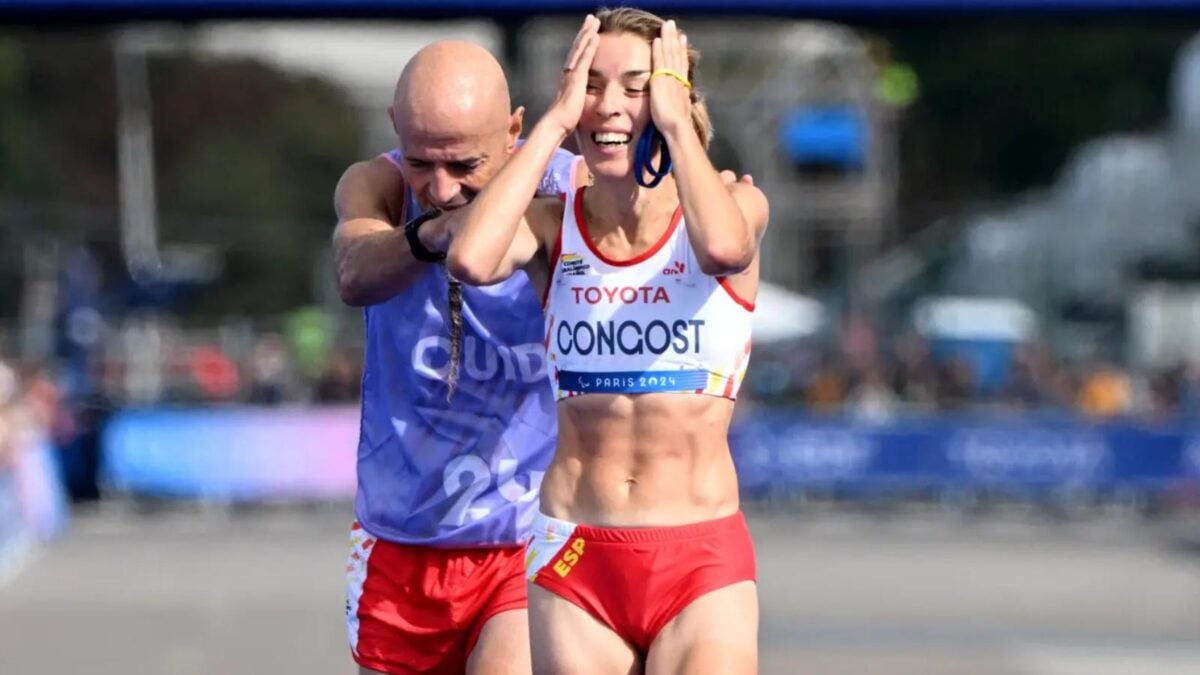Kindness in vain? Paralympian Elena Congost vows to appeal her unfair disqualification and resultant loss of bronze medal for helping her guide Mia Carol
Elena Congost faced disqualification for letting go of the tether to help her guide Mia Carol.

Elena Congost with her guide Mia Carol. (Image credits: Reuters)
🔍 Explore this post with:
A selfless act cost visually impaired Spanish runner Elena Congost her third-place finish and a bronze medal. The women’s T12 marathon runner and her guide Mia Carol were just inches away from the finish line. The duo began to soak it all in until Carol began to cramp up.
Elena Congost and Mia Carol were on their feet for three hours, they had a comfortable lead of three minutes ahead of Japan’s Misato Michishita and her guide. Considering this, Congost slowed down so that Carol could keep up and make it to the finish line. As they were 10 yards away from the finish line, Mia Carol lost his balance and for a moment let go of the tether. The tether is given to blind and visually impaired runners so that they can stay on the right track.
In this instance, Congost lets go of her tether to help Mia Carol get up and save him from falling to the ground. They successfully made it to the finish line and rightfully assumed themselves to have become Olympic Champions. That was until the organizers told her she was disqualified from the race for leaving her tether; albeit briefly, to help her guide up.
Elena Congost and Mia Carol were disqualified due to a rule that should not be applicable in this instance
The rule which cost them the victory was Rule 7.9.3 of the World Para Athletic Rules & Regulations. As per the rule, the athlete and their guide-runner must hold on to the tether attachment from the start of the race up to the end. They are allowed to release the tether only after they have reached the vertical plane of the nearer edge of the finish line and completed the race.

The purpose of this rule was to curb instances wherein athletes used to get past the finish line without their guides. But Congost’s act was a humanitarian act, she could not believe that the Paralympics Committee was punishing her for it.
I couldn't believe what was happening. I'd worked so hard, I'd fought, I'd tried my best. So many people have helped me, and they deserve that celebration with the medal.An emotional Elena Congost told CNN Sport
Her disqualification is not merely unfair but goes against the spirit of sportsmanship, a value that is at the crux of the Paralympic games. Elena Congost made it clear that either way, she and Carol would have made it through the finish line, and her act in no way gave them an unfair advantage.
This rule was written because there were some years when athletes crossed the finish line alone without their guide. But this case has nothing to do with that reason. Nobody pushes me, nobody lets go of me, the tether simply falls while I'm helping him. We could have crossed the finish line walking.Elena Congost added
The Paralympian had to let go of the tether briefly if she was going to be able to help her guide up. She had to act quickly before Carol fell and as she took the decision in the spur of the moment, letting go of the tether was an involuntary response.
She has decided to appeal the decision of the International Paralympic Committee. Considering the circumstances, there is a strong chance of her succeeding, and rightfully so. Taking the top 2 spots in the women’s T12 marathon were Fatima Ezzahra El Idrissi and Meryem En-Nourhi, both representing Morocco.
The 2024 Paralympics marked Elena Congost’s return to the sport after 8 years. She won the women’s T12 marathon at the Rio Olympics in 2016 but did not compete in Tokyo. Her comeback is inspiring as she had four children after her success in Rio De Janeiro.







